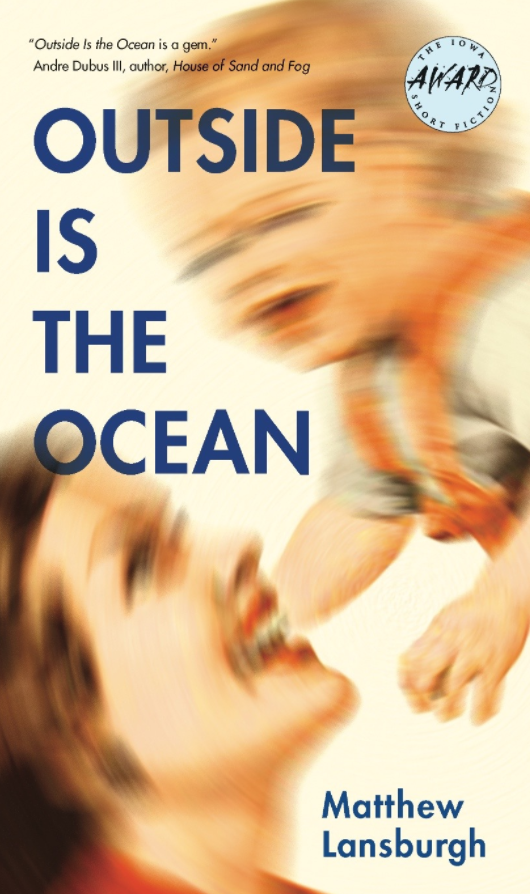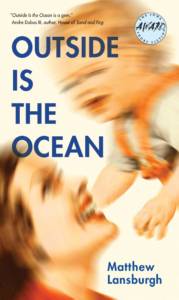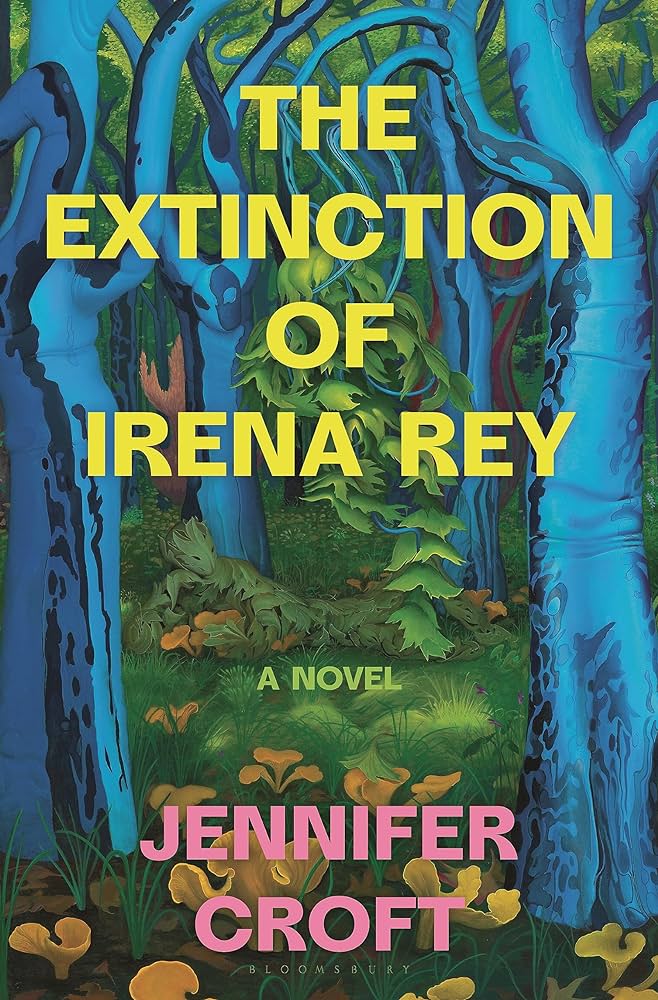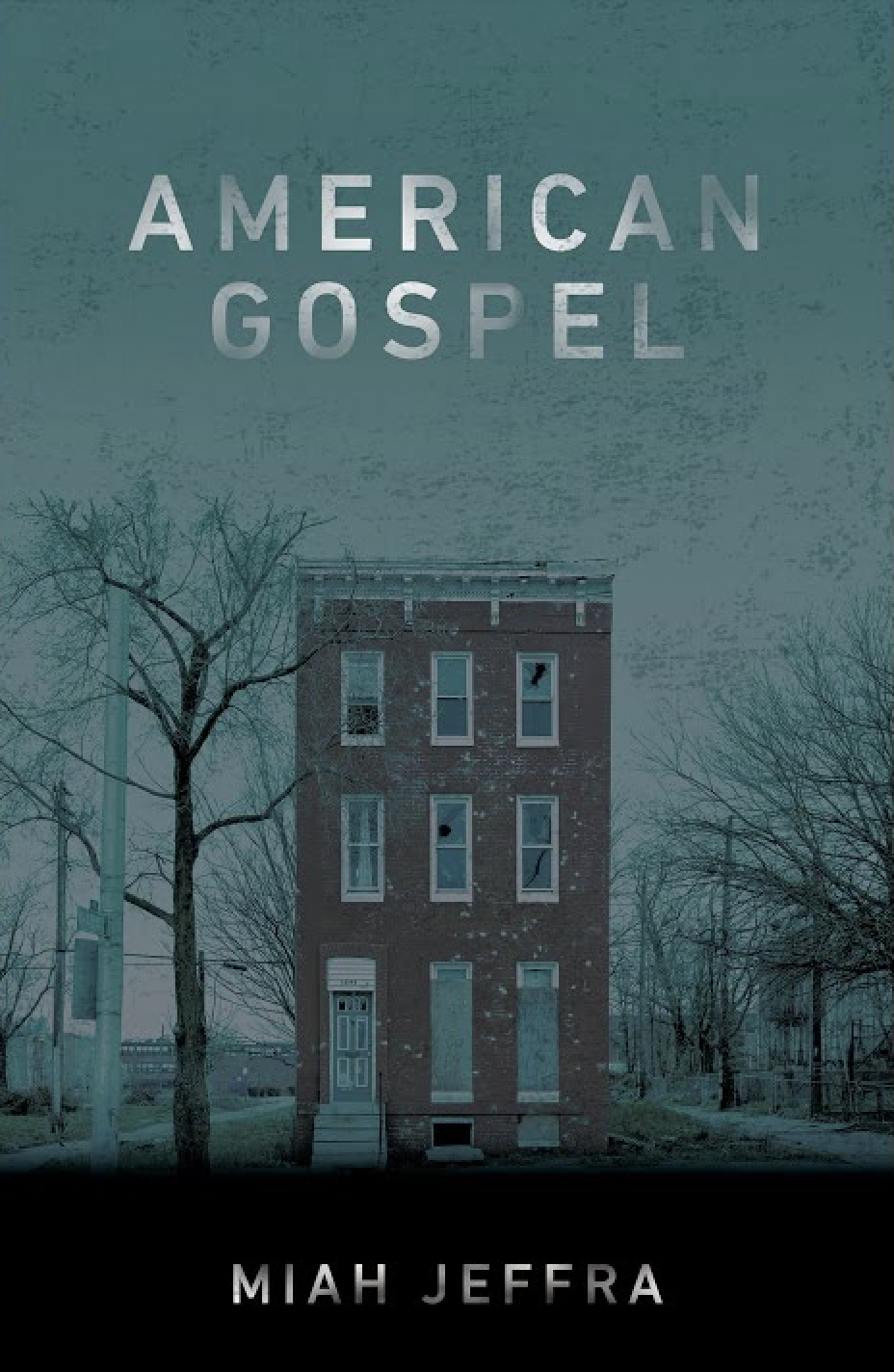Book by MATTHEW LANSBURGH
Reviewed by JULIA LICHTBLAU
Outside Is the Ocean, Matthew Lansburgh’s debut short story collection, is a particularly complete and satisfying example of the linked genre. The stories reveal a long, novelistic arc, while the broken chronology captures the fragmented personality of the central character, Heike, and the chaos she sows.
A gentile, post-war German immigrant to California, Heike speaks and thinks in a German-inflected English that’s full of mangled idioms—as in the opening line of the book: “Al gives me zero.” Or: “She thinks the world will give her French toast on a silver platter.” Heike disappoints and infuriates everyone, but is perversely optimistic, which gives many of the stories a certain hilarity, even the saddest ones. Humor enables Heike’s gay son, Stewart, a literature professor, and her adopted, one-armed Russian daughter, Galina, to survive her boundless narcissism and neediness.
Heike’s psychic reference point is the post-war poverty of Germany, when her family lived in a hut in the forest without running water, and rabbits were one of their few sources of food. She came to America, worked as a maid, and married Stewart’s father, a philanderer with a sadistic streak who divorced her and skimped on child support. As a single mother, she struggled through multiple romances and marriages in quest of security. Heike has no ability to see anyone else’s point of view and no boundaries. She trespasses, swimming in a neighbor’s pool (topless), taking her tenant’s dog out without permission, and throwing one husband’s old family pictures (his previous wife died) in the garbage. She retains a certain sexual vitality, however. And men like her. This is her essential survival skill.
Heike and Stewart are the primary voices—in first person or close third—of the fifteen stories in the collection, which won the 2017 Iowa Short Fiction Award. But her stepdaughter Laurie, Galina, and Zhana, a Russian woman whose family befriended Galina during her childhood, also get their words in edgewise. In the book’s most enigmatic and poetic tale, “The Sky and the Night” (2009), we hear from Ray (aka Raymond), a man who’s been taken in by a woman or women, who call and claim they’re on their way and get him to send money but never show up. He’s the most distant star in Lansburgh’s constellation—Stewart’s father—and the clue to his identity is this paragraph:
His prior wives—women from Germany and Hawaii and Florida and Japan—and his children and kinships had abandoned him decades ago, or he them; the result was the same: a house at the end of a gravel road, twenty miles from town, a single dweller inside, a man with one set of clothes and three pairs of shoes, the soles of which he’d all worn down. His oldest son, the English professor, the one he held in highest esteem, hadn’t called him in years.”
This story leads us on—the way a con man might. We feel sorry for the sweet old drifter. Until we realize that he’s the Raymond who kicked exhausted little Stewart out into the snow at night in his pyjamas for not reading well enough. This kind of subtle reveal—a quarter twist of the corkscrew—is present in many of the stories and shows Lansburgh’s mastery of classic short story technique.
The stories tack across time, from 1967 to 2019, though there is nothing futuristic about the world two years hence. It’s disappointing, just like now. Most story collections can be read in any order. It’s worth reading this one from beginning to end. Lansburgh’s order keeps the whole structure under tension in a way that’s difficult to do outside of the novel and is one of the reasons the book is such a satisfying read.
I’m loathe to reveal the most surprising twist, apparent in the last story, “Buddy,” set in 2019. Suffice it to say that Heike is a seriously unreliable narrator. In “Clear Waters Below” (2013), she drives off to spend Thanksgiving with a woman she barely knows. The woman, she discovers, lives in squalor in a trailer with her dog/surrogate child. Revolted by the smell, Heike leaves after the woman falls asleep and decides to surprise Galina, a budding artist, married, in her twenties, whom she hasn’t visited in five years. Driving, she reminds herself not to be pushy, a lesson from her last visit, when Galina called her “a controlling bitch.” Most of all, she won’t interfere with Amalia, her granddaughter. “If Galina wants to let Amalia play with matches, Heike will watch while the child plays with matches.” She wonders why Galina never sends her pictures of Amalia in the cute clothes she bought. As the sun comes up, she sees the Pacific Ocean and marvels that after all she suffered in the war, she’s here where she dreamed to be. Her eyes get heavy. End of story.
“Amalia” (2013), told from Galina’s point of view, follows. Within a few paragraphs, we learn that Galina and her husband are thinking of having children. He’s obsessing about an agave plant, which might hurt a future baby. Thanksgiving morning, a policeman comes to the door bringing Galina’s seventy-seven-year-old mother, who crashed her car nearby.
Galina, who was a truly feral child, greets her with weary grace. Amalia is one of her mother’s delusions. With a little persuasion, Heike accepts an assisted living. And now we’re in the present of the story: nine days later, when Galina is cleaning out Heike’s house. She finds her adoption papers, which don’t tell her much but affirm her view that her life could have been worse. She watches “Singing in the Rain” on TV, realizing that it was one of the first movies she saw in the States. As she prepares to spend the night in the house, she feels her mother’s absence with a certain nostalgia. Which points to another of the strengths of Lansburgh’s writing—his endings, which manage to be open and conclusive.
There’s “The Lure” (1988), one of the most antic stories, in which Stewart, reluctantly home from grad school in New York, gets sucked into his mother’s plan to take her tenant Linda’s dog Banjo for a walk—against Linda’s express wishes. The dog runs away. Mom follows. The long-suffering Stewart takes refuge in an ice cream parlor. Mom shows up with dog, both smelling of skunk. To distract himself from these absurd indignities, Stewart, who has not yet come out to his mother, mentally relives his sexual adventures. While they are bathing the reeking dog, Linda appears. The showdown is mercifully brief and weapon-free. In the car going home, Heike puts her hand on his knee and reminds him he’s all she has. That would be a pretty good closing. Fade to black. Instead Lansburgh holds the scene for one more beat, immersing us in the smells:
…both of them still smelling of skunk and dog and Linda’s shampoo. Those smells of ammonia and sulfur and apple, and of the cloying green air freshener that hung from her rearview mirror—something that didn’t smell like pine trees or evergreen or anything natural—stayed with him, and he rolled down the window, craving fresh air.”
The effect is to draw the reader right into the car.
As the child who’s supposed to make up for his mother’s suffering, Stewart has born the brunt of Heike’s narcissism and guilt-tripping. The stories in which she doesn’t physically appear—notably the title story—show the damage most clearly. “Outside Is the Ocean” recounts a pickup. Stewart has landed in the apartment of a fabulously wealthy, sophisticated, and handsome Nigerian, a man he’d been staring at in a bar. Yet he dwells on his inadequacies. “How many times has he gone to the Ramrod and stood alone in a corner, nursing a club soda or, sometimes, if he was feeling adventurous, a beer, until it was time to shuffle back to his apartment?” He almost stayed home. He should have called his mother to congratulate her on having adopted a four-year-old Russian girl. He feels inconsequential. He hates his red hair, his whiteness, all the things that make him like his mother.
Lying tied up on a bed, mouth taped, he recalls a grotesque scene with his sadistic father, who liked to kill and mangle rattlesnakes and to force Stewart to shoot guns. (No need for Dr. Freud to explain that symbolism.) Stewart wakes up, unbound. The apartment is empty—except for the dog. He’s tempted to steal something precious, a gold pen, a large turquoise rock. In the end Stewart rips out a page from Tazik’s diary in which he confesses his anger and hurt toward a former lover. Stealing this powerful man’s secret vulnerability makes him feel “more alive—more powerful than he’s felt in some time.”
We ache for Stewart and want to smack him out of his self-absorption at the same time. Your sister had it worse, we want to say. One arm, an orphan. She made something of herself.
Many of the stories in this collection have been published in top journals—Glimmer Train, The Florida Review, Slice etc.—and it’s not hard to see why. Structure is everything in story-writing. Classic short stories package universality, economy, and an element of surprise. Each piece of Outside Is the Ocean accomplishes that. At the same, the broad architecture of the whole promises more and bigger work from Lansburgh.
Julia Lichtblau is the book review editor of The Common. Her work is forthcoming in American Fiction 17 and has appeared in The American Scholar, Blackbird, Narrative, The Florida Review, and other publications. She teaches at Drew University and covered international finance in New York and Paris for BusinessWeek and Dow Jones Newswires. She has an MFA in Fiction from Bennington College and lives in Brooklyn, N.Y.





